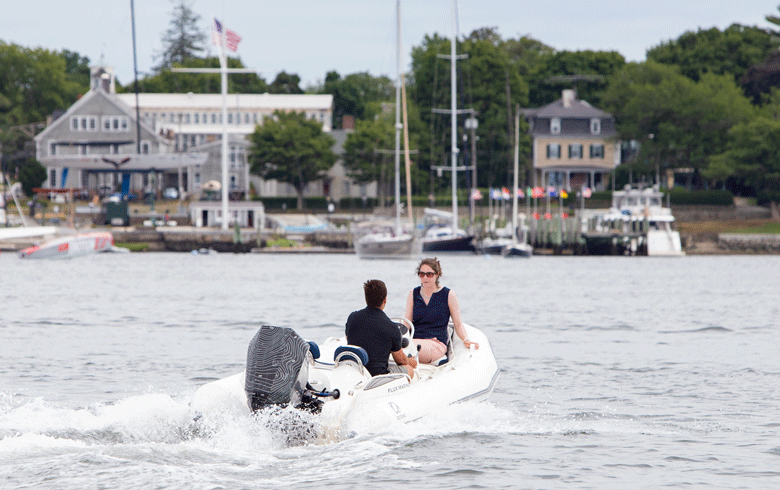Aboard a rigid inflatable boat traveling upwards of 40 knots, experiencing acceleration I’d previously associated with drag racing, it was clear the electric motors at Flux Marine in Bristol, R.I. pack a punch.
The goal of my visit was to shoot photos and videos of the outboard motors in action, which proved difficult, given that the boats moved at speeds difficult to document.
Notably, I was able to capture some audio as we puttered around the no-wake zone of the harbor. My colleagues conversed at a modest decibel over the gentle whirr of the electric outboard motor. Then we gunned it to the outer reaches of Bristol Harbor, and the conversation faded—not for the loud roar of a gas-powered engine, but for the thrill of only hearing slapping waves against the hull as the wind blew in our faces.
Then we gunned it to the outer reaches of Bristol Harbor, and the conversation faded…
So, if your doubts about the potential of electric outboard motors are seeded in your need for speed, your speed-demon desires will be satiated by this rapidly evolving technology. There is room to grow and advance in the world of electric boats, but technology develops quickest when the device is practically applied. Its affordability follows the same arc.
The Island Institute, eager to steer Maine’s working coast toward an economically sustainable and climate-friendly future, aims to expedite the technological advancement by making this cutting-edge technology more accessible to those who will benefit most from it. By awarding targeted grants and making critical connections, the Island Institute is looking to place 100 electric outboard motors in locations on the coast that will maximize impact. The more people see these outboards in action, the more attractive they’ll be to the consumer.

There are hurdles in the process of adopting new technologies, and the Island Institute is addressing each as it comes. Education is essential. If familiarity with the outboards doesn’t grow, integrating them into the working waterfront will be difficult. And so the Island Institute is teaming up with the Maine Community College System, Maine Electric Boat Company, and Midcoast School of Technology to develop a series of tiered online courses addressing the basics and benefits of electric motors. Subsequent courses will get into electrical theory, and ultimately the user will learn the skills to work as a technician on electric boats.
An innovative spirit is another element needed. New England is rich with marine-based entrepreneurs who accelerate this work with the same speed as the outboard motor that sent me rocketing across Bristol Harbor. Flux Marine, the Rhode Island startup company, is assembling the engines, performing retrofits, and doing new builds for electric boats. Matt Tarpey of Maine Electric Boat Company in Biddeford is working to get these electric motors to consumers by renting and selling a variety of electric boats, from leisurely cocktail vessels to the heavy-hitters akin to those I witnessed at Flux Marine.
While these entrepreneurs get their hands dirty—or maybe less dirty when they aren’t messing with diesel—they are identifying areas for improvement. One Island Institute-funded experiment that hit the water in late August is the solar dock Matt Tarpey and his father, Sean, have long been gearing up to deploy. This is their first foray into solving the issue of battery charging on the working waterfront. Taking the power from the sun and putting it directly into the batteries that power the electric boats creates a clean, onsite, closed-loop solution.
While this iteration of the solar dock will not serve as an end-all solution to charging high-power electric motors, it will satisfy the charging needs for their low-speed motorboats. Thankfully, the solar panels embedded in the dock are uniquely rugged, able to withstand bait-covered work boots.
The Island Institute will continue to foster this innovation out of necessity. Advancement in electrification is essential for long-term solutions to climate change and to easing the impacts of volatile fossil fuel prices.
Maine’s working waterfront is no exception to this transition, and it needs the support even more than other sectors. Real estate pressure, climate challenges, and an unpredictable economy continue to threaten our working waterfronts. An electrified coast is one way to bolster up.
Jack Sullivan is a multi-media storyteller with the Island Institute, publisher of The Working Waterfront. He may be reached at jsullivan@islandinstitute.org.





